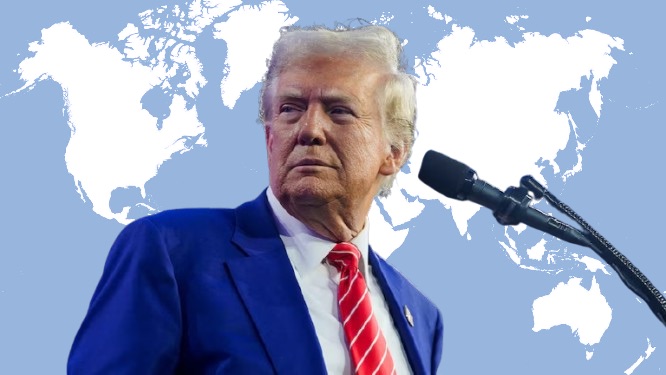World Geostrategic Insights interviews with on the changes in American foreign policy under the Trump administration, and the reasons behind the ongoing geopolitical shifts and global realignments.

Dr. is the head of the Strategic Foresight Program, John Lukacs Institute, Ludovika University of Public Service, Budapest, and a former advisor to the Hungarian NATO mission and Ministry of Defence. He is a writer and the author of the “Fury of the Tsar”, a book series that gives an exclusive insight into Vladimir Putin’s mindset, and on the West versus Russia and China.
Q1 – The post-1945 world order appears to be even more in question with President Trump in the White House. Indeed, Trump’s second term seems to bring significant changes in American foreign policy, redefining alliances, and moving away from traditional partners. Is Trump an anomaly or a representative of a trend that is taking hold in US politics? Are we witnessing a global geopolitical realignment?
A1 – We’re seeing a very significant change in American strategy – but it’s not really new, except in style and pace, and there are very serious structural reasons for it. That is, it’s not simply a change in US priorities – it’s a change in the global situation to which US priorities are responding.
The world is not the same as it used to be 20-30 years ago.The unipolar world ended sometime during the global economic crisis of 2007-2009 – and since roughly 2009 US policy has clearly shifted towards Asia, especially China. Already under President Obama, then the first Trump and the Biden administrations, it was clear that for the US the first in the order of priorities was the Far East, second the Middle East and Europe was only the third. So it is not simply moving away from traditional partners, the US is not moving away from Japan or Australia. It is moving away a bit, but not fully from Europe.Words are important, but we did not see “NATO redefined”. Well, yet, but I don’t think it is going to happen in a dramatic way.
We should really look at the numbers, what the US is reacting to. In terms of GDP in purchasing power parity, China in 1990 stood at 3.63%, India at 3.47%, the current EU nations at 25%, U.S at 21.8%. Yes, the US slice of global GDP today is 26% in nominal terms, roughly in line with the average over the last half century, but only 15% at purchasing power parity, which is much more reflective of reality. Europe’s slice is 14.4%, China’s is 19% and India’s is 8.2%. The largest economy today is clearly China, and this does not even fully reflect its real power. Services, Hollywood, or the New York Stock Exchange do produce a lot of GDP, but do not produce tanks, ships or fighter-bombers.
Moreover, we should really wake up to the fact that Chinese industrial output is 31.6% of global output, the USA is half of that, only 15.9%, Germany is 4.8%, India is 2.9%. And if we look at the experience of the war in Ukraine, industrial capacity is a crucial power factor. So what Donald Trump says and plans is logical: bring back industry to the United States. And that means problems with allies, trade wars, conflicts. This is not really good for Europe, but President Trump was elected by American voters, not by Europeans.
Q2 – Trump seems to be loosening his ties with Europe, trying to get closer to Russia. Does Trump want to involve Russia in an axis against China, or at least distance Moscow from Beijing? Is it realistic to think that Russia could loosen its ties with an essential economic and political partner such as China is now?
A2 – I would like to underline again that there is a fundamental change in the balance of power. In 1990 the Western world accounted for nearly half of global GDP and today it accounts for less than a third meanwhile Chinese industrial capacity is twice that of the US. What China is missing is raw materials, and Russia can provide China with almost everything, mostly using a safe land route. This is a problem. The US military superiority is also much smaller than 35 but even 10 years ago. China and Russia together would be a formidable opponent indeed.
Thus, a close and evolving Russian-Chinese cooperation is definitely very bad for the US. Washington needs balancing, and since China is the peer competitor, it is logical to try to talk to Russia. This is not just Trump, this is a basic geopolitical reality. I guess President Trump intended to drive a wedge between China and Russia during his first presidency, but his hands were tied with investigations like “Crossfire Hurricane” back in 2016 then the “Mueller special counsel investigation” that started in 2017. The “Russia collusion” allegations were successful in stopping any attempt to bring an understanding between Russia and the United States. The unfortunate fact is that now the 2nd Trump administration has an even more uphill battle. Chinese-Russian relations are deeper than 4-5 years ago, the Russian aggression against Ukraine understandably changed European attitudes. And of course Russia may trust Donald Trump, but does not trust fully he can deliver. So it is questionable that Washington can be fully successful, but not trying guarantees failure.
Q3 – Since World War II, Europe has occupied a central place in American foreign policy. However, in the recent past tensions have emerged between Washington and Brussels, especially on commercial and military issues, and now the European Union and the United Kingdom, historical allies of the United States, seem completely neglected in President Trump’s American diplomatic strategy. The need for an independent European strategy is therefore gaining ground, and the President of the European Commission, Ursula von der Leyen, has called for a strengthening of European military capabilities. Will the Trump presidency force Europe to realign itself, to make a real strategic change? Will Europeans be able to overcome their differences and build a credible common defense ? What weight could a Europe no longer closely aligned with the United States have on the global stage?
A3 – Indeed Europe is less important than before, as the main challenger of the US is not the Soviet Union as between 1945-1990, but China. Russia is only problem number two or three, possibly behind Iran. I do not agree that the EU or the UK is completely neglected. I’m sure that the US does not want to withdraw from NATO or even loosen ties. It simply wants different, militarily stronger European partners. It wants a Europe that spends more on its defence, and that is good. Without the first Trump administration, even less European countries would be around 2% military spending today. There is also an ideological divide, and we should not underestimate the importance of that. Both sides view the other with suspicion. But purely from a balance of power point of view, a militarily strong Europe is good for the US. Of course keeping the security ties are even more important for Europe.
Europe alone is unlikely to be a major player. The political differences, and differences of interests are too big between EU member states and there are plenty of unsolved historical problems. But we could and should cooperate on building a stronger and more united European defence industry. We could work on developing certain capabilities together. But if the goals are too ambitious, we will not reach even what is possible. To pick the low hanging fruits today and tomorrow is better than to aim for a fruit that is unreachable for the foreseeable future.
Q4 – In the current evolving geopolitical scenario, we see the emergence of the so-called “Global South”, which asserts its desire to “de-Westernize” the world and refuses to belong to either. Will the Global South really be able to foster a realignment of the world geopolitical equilibrium, and the formation of a new world order?
A4 – The “Global South” is more than a hundred different countries, with different outlook and interests, but indeed there is something in common in most of these nations: they were colonies of the West. And for most of them, this historical experience is not positive. In Europe we tend to forget that history matters. India is rising fast, New Delhi is already contributing to a new geopolitical reality. They are buying much of the Russian oil the Europeans are not buying.
The second greatest increase in Russian oil import is from Turkey. Since 2022, Latin-America and Africa had also doubled their respective oil imports from Russia. Thus the “Global South” is having a direct impact on the war in Ukraine. This is of course just one issue of many. Only we Europeans believe that the tragic war in Ukraine is the most important global security issue. Others have different opinions. We are already in a new world, because of the rise of China, India, Indonesia, Brazil and others. So yes, I believe that the rise of these countries is leading to a new world order.
Dr. Attila Demkó – Head of the Strategic Foresight Program, John Lukacs Institute, Ludovika University of Public Service, Budapest.







